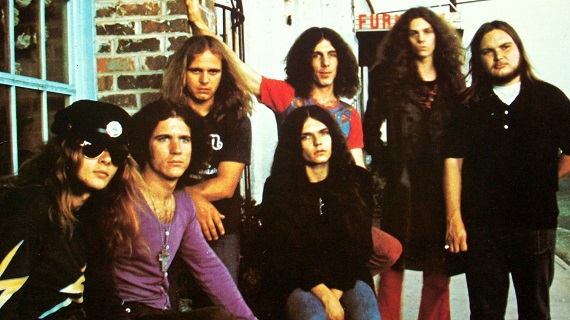Hot ‘Lanta – Allman Brothers Band
The typical standard jazz composition that would be played by Miles Davis or John Coltrane is exactly the same type of composition as “Hot ‘Lanta.” It begins with the melody (which is repeated), moves into a section where everyone takes turns improvising (Duane Allman melts off your face), and then concludes with a final statement of the melody.
Southbound – Allman Brothers Band
“Southbound” was on the album “Brothers and Sisters,” which was their first album completely without Duane Allman and their last album with Berry Oakley. Dickey Betts was mostly in charge of the band on this album, and Southbound was one of his all-time great compositions.
Tuesday’s Gone – Lynyrd Skynyrd
There was always great mutual respect between Skynyrd and the Atlanta Rhythm Section, and ARS drummer Robert Nix is the one who actually plays on this one, not Skynyrd drummer Bob Burns.
Simple Man – Lynyrd Skynyrd
Ronnie Van Zant wrote this song upon the passing of his grandmother, and he intended it to be the loving advice passed on from a mother to her son. The guitar solo is classic Gary Rossington.
Uneasy Rider – Charlie Daniels
This song masterfully represents the great dichotomy that had developed in the South when outlaw rebels looked a lot like long-haired hippies, and frequently had some run-ins with the standard old-fashioned Southern boys.
The South’s Gonna Do It – Charlie Daniels
Many of the musicians on these lists are referenced in this classic by Charlie Daniels, who predicts that the South will rise again, but perhaps this time with music and culture. Since the South has always had better music than everybody else, Charlie was right.
Bougainvillea – Dickey Betts
Dickey was never the same type of guitar virtuoso as Duane (who was?), but his songwriting skills were extremely superb. “Bougainvillea” has a lot in common with the old Allman Brothers classic Sweet Melissa.
Willin’ – Little Feat
Although founder Lowell George was from Hollywood, he and so many other southern California musicians were heavily influenced by true Southerners Gram Parsons and Emmylou Harris. Lowell George played in several bands, but his signature band Little Feat was really named after his own little feet.
Oh Atlanta – Litte Feat
“Oh Atlanta” is a Charlie Daniels song, but Little Feat adds some bite to it. When Charlie finally released his own version years later, it had a lot more of a country sound.
Can’t You See – Marshal Tucker
“Can’t You See” was written by Toy Caldwell and was originally released in 1973, although it didn’t hit it big on the charts until 1977. However, it has the exact same three chords as “Sweet Home Alabama,” and it was officially released a year earlier.
Midnight Promises – Toy Caldwell and Gregg Allman
The year before his 1993 death, Toy Caldwell released an eponymous album called “Toy Caldwell,” which his friend Charlie Daniels later re-released under the name “Son of the South.” This is a masterful track that includes Gregg Allman.
She Talks to Angels – Black Crowes
This is one of the finest rock ballads ever recorded, and was on the debut album of the Black Crowes in 1990. Composer Chris Robinson wrote the song about a goth girl he knew in Atlanta.
The Guitar – Guy Clark
Guy Clark was one of those hidden musicians that wrote tons of songs for everybody else, but rarely got the recognition for himself. This song gives me chills every time I hear it.
Ohoopee River Bottomland – Larry Jon Wilson
Swainsboro native singer/songwriter Larry Jon Wilson wrote this about his home and included it on his debut album in 1975. Although praised by his fellow musicians, Wilson never had a hit record, and continually drifted in and out of the music business until his death of a stroke in 2010.
East Bound and Down – Jerry Reed
Jerry Reed was pure and simple one of the hottest guitar players to ever come out of the South. And yet, for all that talent, he really seemed to enjoy making fun of himself, and this signature song from “Smokey and the Bandit” will always be a classic, as it capitalized on the CB radio craze of the late 70’s.
Pride and Joy – Stevie Ray Vaughan
One of the greatest guitar players of all time, Stevie Ray Vaughan grew up in Dallas and became a driving force in the Austin music scene. “Pride and Joy,” written in classic 12-bar blues form, was his first single off his debut album in 1983.
Large Time – Atlanta Rhythm Section
Guitarist James Cobb was a member of the 60’s pop band Classics IV which had several giant hits. In the early 70’s, he was teamed up with several local Southern musicians as the house band for a studio in Doraville, and they soon broke away and started recording and touring under the name Atlanta Rhythm Section.
Dixie Dregs – Take It Off The Top
The Dixie Dregs were formed by guitarist Steve Morse, and represented kind of a jazz/Southern rock superband based out of Augusta and recording on the Capricorn label.
The Creeper – Molly Hatchet
Larry the Cable Guy once said that they tried to get a Molly Hatchet cover band to play their high school reunion, but it turned out to be cheaper to just get Molly Hatchet. Sometimes a Southern Rock band, and sometimes a heavy metal band, “The Creeper” has a great swamp rock feel for the boys from Florida gator country.
Night They Drove Ol Dixie Down – The Band
Canadian Robbie Robertson wrote this song specifically for The Band’s drummer, Arkansas native Levon Helm. They tried to cover the last days of the CSA with respect as seen from the viewpoint of a typical Southern citizen. However, Levon Helm stopped performing the song when Joan Baez released her version with slightly different lyrics.






